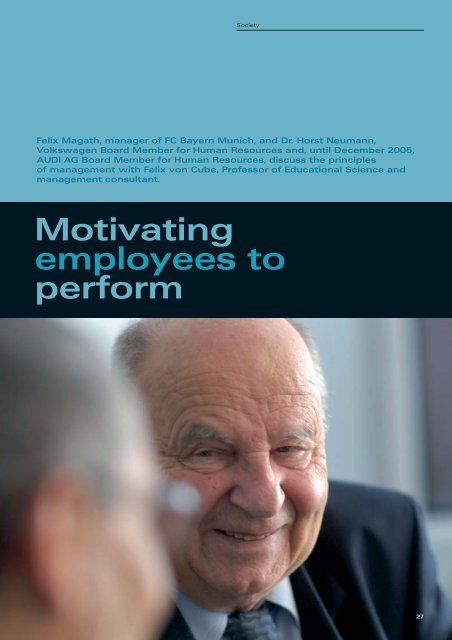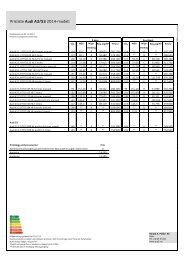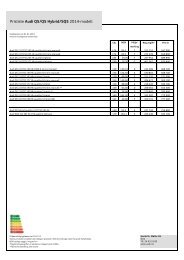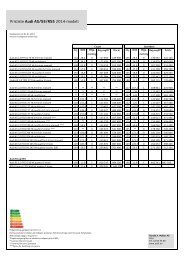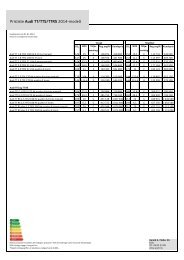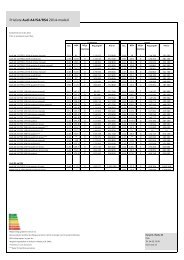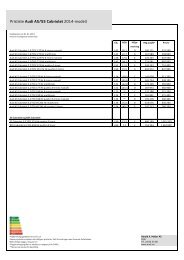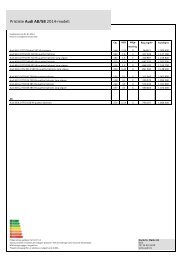Motivating employees to perform - Audi
Motivating employees to perform - Audi
Motivating employees to perform - Audi
You also want an ePaper? Increase the reach of your titles
YUMPU automatically turns print PDFs into web optimized ePapers that Google loves.
SocietyFelix Magath, manager of FC Bayern Munich, and Dr. Horst Neumann,Volkswagen Board Member for Human Resources and, until December 2005,AUDI AG Board Member for Human Resources, discuss the principlesof management with Felix von Cube, Professor of Educational Science andmanagement consultant.<strong>Motivating</strong><strong>employees</strong> <strong>to</strong><strong>perform</strong>27
Societyhome <strong>to</strong> an emphatic 4-0 vic<strong>to</strong>ry over Rapid Vienna in the UEFAChampions League. At the same time, <strong>Audi</strong> was being presented withthe coveted “Au<strong>to</strong> Trophy” in Berlin for the <strong>Audi</strong> A6, <strong>Audi</strong> A8 and<strong>Audi</strong> Q7.In order <strong>to</strong> motivate <strong>employees</strong>, the world of work must first beorganised in such a way that they are able <strong>to</strong> experience a “flow”,expounds von Cube. This term was developed by the psychologistMihaly Csikszentmihalyi. He describes a state in which an employeebecomes completely involved in an activity and is thus motivated byit in its own right.Felix von Cube stands out from the mass of guiding intellectualforces in the sphere of management in a great many respects. Hisbackground is in the realm of the natural sciences, more precisely inbehavioural biology. According <strong>to</strong> von Cube, one of the key errorsmade by managers is that they have a completely unworkable notionof human behaviour. Anyone seeking <strong>to</strong> motivate <strong>employees</strong> needs arealistic picture of people as their basis. This includes a knowledgeof man’s impulse structure and behavioural programmes. In thesphere of work, so von Cube’s core thesis goes, no desire can beexperienced without effort.The self-professed followers of this philosophy include FelixMagath, manager of FC Bayern Munich, and Dr. Horst Neumann,until recently Board Member for Human Resources at <strong>Audi</strong> and nowin the same function at Volkswagen. Magath and Neumann met upwith von Cube at Bayern Munich’s base in Säbener Strasse <strong>to</strong> discusshis management concept. The previous evening, Bayern had rompedSo how can the world of work be organised so that <strong>employees</strong> candevelop a sense of flow?von Cube: There really is still plenty of untapped potential forthis! There are vast swathes of corporate life in which the conditionsfor <strong>employees</strong> <strong>to</strong> develop a sense of flow do not yet exist. On theother hand, Mr. Magath, it was evident from the way your teamplayed last night that they were enjoying what they were doing. Howdo you achieve this? And above all, how do you keep achieving this?Magath: It’s genuinely becoming more and more difficult <strong>to</strong>keep up such a situation for any length of time. You can’t achieve itwith external incentives, the players’ enthusiasm has <strong>to</strong> come fromwithin. Paying a player a 5,000 euro bonus for winning doesn’t dothe trick. Money is now a basic requirement that has <strong>to</strong> be met –there’s no more <strong>to</strong> it than that. In the days when I was a professionalplayer, things were somewhat different. Your aim was <strong>to</strong> earn a millionmarks in the course of your career so that you could live comfortablyfor the rest of your life. That was a real source of motivation.Bayern Munich’s players are first and foremost pursuing a different28
Felix Magath:“Anyone seeking<strong>to</strong> motivate<strong>employees</strong> needsa realistic pictureof people astheir basis.”objective: <strong>to</strong> come <strong>to</strong>p. Comingsecond counts for nothing. Buta club such as Chelsea hasn’twon anything like the numberof titles that we have, andthat makes them much morehungry for success. As well asenjoying playing, a footballermust above all enjoy winning. That’s why staying at the <strong>to</strong>p is infinitelymore difficult than getting <strong>to</strong> the <strong>to</strong>p.Dr. Neumann, how do you pave the way for flow among the <strong>employees</strong>of a car manufacturer?Prof. Dr. Felix von Cube, born 1927, was Professor ofEducational Science at the Universities of ProfessionalEducation in Berlin and Bonn, as well as at theUniversity of Heidelberg. In 1997 he and two colleaguesestablished the Heidelberg-based companyProf. von Cube & Kollegen GmbH. The companysupports companies on questions relating <strong>to</strong> motivationand employee leadership. Von Cube has writtena large number of books and specialist articles.Felix Magath, born 1953, has been the manager ofFC Bayern Munich since July 2004. Born in Sailauf,near Aschaffenburg, he was himself a professionalplayer in the 1970s and 1980s, playing for Saarbrückenand Hamburg SV. Magath’s tally as playmakerwas 306 Bundesliga games and 46 goals.Magath was capped 43 times for West Germany,winning the European Championship in 1980. Hesteered VfB Stuttgart <strong>to</strong> runners-up in the league andthen, in his first season in charge of Bayern Munich,guided his team <strong>to</strong> a league and cup double.Dr. Horst Neumann is Board Member for HumanResources at Volkswagen. Born in Leverkusen in1949, he <strong>to</strong>ok his doc<strong>to</strong>rate in Economics and SocialSciences and began his career as spokesperson forNeumann: We, <strong>to</strong>o, believe it is important for <strong>employees</strong> <strong>to</strong>derive pleasure from their work. The basic requirements are an interestingactivity and a good relationship with colleagues and superiors.Attitude surveys have repeatedly made it very clear that people actuallyrank these fac<strong>to</strong>rs as more important than pay. The key thing isthat a person must be able <strong>to</strong> complete their work comfortably butthat it nevertheless always constitutes something of a challenge.Then there is the organisational scope such as group work, which<strong>Audi</strong> introduced a long time ago. It gives the individual employeeadded responsibility. The regular model changeovers in the car industryconfront <strong>employees</strong> with a constant stream of new challenges.Incidentally, we also pursue the goal of coming <strong>to</strong>p here at <strong>Audi</strong>!Mr. Magath, you used <strong>to</strong> have a reputation among your players assomething of a slave-driver. Yet you are drawn <strong>to</strong> von Cube’s principlesand emphasise the importance of enjoying your work. How doyou reconcile the two?Magath: I don’t see any contradiction there. Basic physicalfitness is absolutely essential. A player must be able <strong>to</strong> push himselfphysically <strong>to</strong> his limits. It’s only then that you can start enjoyingyourself.von Cube: A person’s bond with a company also influencestheir inclination <strong>to</strong> <strong>perform</strong>. An employee who identifies with theircompany will <strong>perform</strong> better. Yet football players in particular arenot exactly the most loyal of <strong>employees</strong>. Does the notion of loyaltystill have any meaning in the world of professional football?Magath: Absolutely! Italian and British clubs have much moremoney <strong>to</strong> spend than we do, and consequently they are able <strong>to</strong> payhigher salaries. We try <strong>to</strong> compensate by offering a family atmosphere.But it’s getting more and more difficult for the club <strong>to</strong> holdthe Berlin Sena<strong>to</strong>r for Economics. From 1978 <strong>to</strong> 1994,Neumann worked in the Economics Department atthe head office of the IG Metall metalworkers’ tradeunion in Frankfurt. At <strong>Audi</strong>, Neumann was instrumentalin drawing up the company agreement “TheFuture of <strong>Audi</strong> – Performance, Success, Sharing”,which combines competitiveness and job securitythrough <strong>to</strong>p <strong>perform</strong>ance.29
Societyon<strong>to</strong> its players. Talented footballers are now being lured away evenwhile they are still in the youth teams. So they are less likely <strong>to</strong>experience a longer spell with the same club, and that makes it moredifficult for them <strong>to</strong> identify with a single club. I played for HamburgSV for ten years, and that was important <strong>to</strong> me. I’m in no doubt thata player will <strong>perform</strong> better if they identify with their club.And how does the situation look at <strong>Audi</strong>?Neumann: The bond between the workforce and the companyhas traditionally been a strong one. We’ve often had entire families,across several generations, working at <strong>Audi</strong>. We attach importance<strong>to</strong> long-term and ideally life-long employment. Our people are trulydedicated <strong>to</strong> the company.von Cube: I believe acknowledgement of <strong>perform</strong>ance isanother important motiva<strong>to</strong>r. This could for instance take the formof greater influence, higher pay, greater decision-making authorityor personal praise. How important is acknowledgement for thesuccess of football players?Magath: It depends which individual player you are dealingwith. A young player such as Bastian Schweinsteiger has flow, and ishighly motivated by the game itself; other players, particularly themore experienced ones, need more external acknowledgement. Themedia can therefore have a very large influence on events. Everythingthat the players do is scrutinised, and every mistake laid bareby the televised highlights. But excessive praise as well as negativecomments can be detrimental. Especially if I don’t think that praiseis merited. I then have <strong>to</strong> bring the player concerned back down <strong>to</strong>earth.Neumann: We attach considerable importance <strong>to</strong> <strong>perform</strong>ancerelatedremuneration. We have extended the previous profit-sharingHorst Neumann:“We want our<strong>employees</strong> <strong>to</strong>derive pleasurefrom their work.”arrangements through our agreemententitled “The Future of<strong>Audi</strong>”. Ten percent of any futurerise in earnings will be distributedamong the <strong>employees</strong>.But I am delighted <strong>to</strong> note that<strong>Audi</strong>’s <strong>employees</strong> believe the acknowledgement for turning outsuccessful products is much more important than money. Simply theknowledge of having developed and built a superb car is the biggestincentive there is for <strong>Audi</strong>’s workforce. <strong>Audi</strong> models have scoopedan array of awards latterly. They have triumphed in head-<strong>to</strong>-headcomparisons, have won the “Golden Steering Wheel”, the “Au<strong>to</strong>Trophy” and many other titles, including in mo<strong>to</strong>rsport – not leastthe legendary Le Mans race.von Cube: Other managers have had their players running overred-hot coals. What do you think of such methods?Magath: That’s pointless. Other things are at stake, such asdependability. The players need <strong>to</strong> know where they stand. That’swhy I always try <strong>to</strong> make my announcements as clear as possible andgive individual players a clear idea of their position in the team, bothas a player and as an individual. | Ralf Nöcker30
newsIf the company is a success,its <strong>employees</strong> are a successDr. Werner Widuckel hasbeen Member of theBoard of Management ofAUDI AG with responsibilityfor Human Resourcessince December 8, 2005.He succeeded Dr. HorstNeumann, who wasappointed the VolkswagenGroup’s Board Memberfor Human Resourcesand Direc<strong>to</strong>r of Personnelwith effect from December 1, 2005. 47-year-oldWiduckel, a social scientist by background, worked forVolkswagen AG in various capacities since 1985 beforejoining the Human Resources department at <strong>Audi</strong> inMarch 2005 as Head of Personnel Policy and Key Issues.In this article, he outlines the goals he has set himself.<strong>Audi</strong> aims <strong>to</strong> succeed in competition with other car companies. Ifwe are <strong>to</strong> achieve our ambitious strategic goals, we have <strong>to</strong> expectever higher standards of <strong>perform</strong>ance from our <strong>employees</strong>. It will,however, only be feasible for them <strong>to</strong> meet these rising expectationsif <strong>Audi</strong> offers its <strong>employees</strong> attractive conditions in which <strong>to</strong><strong>perform</strong>. It is one of <strong>Audi</strong>’s strategic objectives <strong>to</strong> be a highlyattractive employer. Such an employer ensures that the success ofthe company is equated with the personal success of its <strong>employees</strong>.The quality and efficiency of the work <strong>perform</strong>ed within acompany depends above all on the quality of its management andorganisation. Both of these fac<strong>to</strong>rs encourage a readiness <strong>to</strong> <strong>perform</strong>much more than incentives which, while rewarding <strong>perform</strong>ance,do not in themselves provide motivation. Because people have afundamental urge <strong>to</strong> achieve things, <strong>perform</strong>ance is an essentialfac<strong>to</strong>r in personal development. Through <strong>perform</strong>ance, goals areachieved; when the individual achieves goals, their ability <strong>to</strong> identifywith their work is strengthened. Performance translates in<strong>to</strong>success. I witness every day anew the extraordinary degree <strong>to</strong>which our <strong>employees</strong> identify with <strong>Audi</strong>, and the passion theyinvest in making the company a success. They view themselvestruly as part of <strong>Audi</strong>, and are proud of the company’s tradition andsuccesses. What is more, the people at <strong>Audi</strong> are not merely part ofan organisation; they are part of a community of <strong>perform</strong>ers.However paradoxical it may sound, this community of <strong>perform</strong>ersencourages risk-taking precisely because it offers security.The high-<strong>perform</strong>ance potential of the workforce needs <strong>to</strong> bemobilised and realised through leadership. Communicating thecorporate objectives is the basis on which this is accomplished. Itmeans making all <strong>employees</strong> fully aware of the significance of thecompany’s strategic objectives and of the consequences of intensifyingcompetition for their own activities, <strong>to</strong>gether with the challenge<strong>to</strong> <strong>perform</strong> that this entails. Only when this communicationis effective will <strong>employees</strong> identify with the corporate strategy,accept the greater challenge <strong>to</strong> deliver even higher standards ofefficiency, quality and innovation, and show commitment <strong>to</strong> thecause. If this challenge is met with enthusiasm, it must beacknowledged. Because acknowledging <strong>perform</strong>ance and commitmentis the basis for appreciating what <strong>employees</strong> do andkeeping them loyal <strong>to</strong> the company. But those who demandcommitment must also allow commitment. Commitment dependson there being a certain leeway <strong>to</strong> act. The ideal of the committedemployee who shows enterprise in the way they think and act isnot one that is based on authority and obedience. Quite the opposite:if you demand commitment, you must make allowance fordisagreement. This calls for a form of employee leadership thatis characterised by respect, dependability and trust. If everyemployee is <strong>to</strong> be allowed and expected <strong>to</strong> contribute their ideason improving working processes in this spirit of entrepreneurialcommitment, they will also come <strong>to</strong> share responsibility for thesuccess of the company. This is the entrepreneurial core principleof <strong>Audi</strong>’s goal <strong>to</strong> be the most attractive employer. An attractiveemployer establishes the framework for high <strong>perform</strong>ance andsuccess, and a successful employer is an attractive one. The successof the company makes jobs safer, increases the scope forcareer development and advancement, and paves the way forsharing in the material trappings of the company’s success.A secure future for <strong>Audi</strong><strong>Audi</strong> has clearly affirmed its faith in Germany as aproduction base: “The Future of <strong>Audi</strong> – Performance,Success, Sharing” is the title of the agreementsigned by the Board of Management andGeneral Works Council of AUDI AG on April 8, 2005.This agreement gives the 45,000 <strong>employees</strong> atIngolstadt and Neckarsulm the assurance thatthere will be no redundancies for operational reasonsbefore 2011. The company agreement furthermorepaves the way for more flexible workinghours and extends profit-sharing for all <strong>employees</strong>.31
32The precision
SocietyProfessor Hänsch, how has your life changed since winning theNobel Prize?Hänsch: I was absolutely delighted <strong>to</strong> receive such an accolade,but I regard the whole thing with rather mixed feelings. SinceDecember I have been receiving simply piles of invitations <strong>to</strong> speakat events all over the world. I was starting <strong>to</strong> worry that <strong>to</strong>o many lecturesand receptions would get in the way of my work. I had <strong>to</strong> learn<strong>to</strong> say “no” more often, and decline many an interesting invitation.Why are you, a Nobel Prize winner, in greater demand than otherresearchers? After all, your work hasn’t changed …Hänsch: Fortunately it hasn’t affected my dealings with myspecialist colleagues. But for the public, it’s different. Maybe onlyfew people understand exactly what it is that I am researching.As a research scientist, do you tend <strong>to</strong> think about how your findingsmight subsequently be of use <strong>to</strong> industry?Hänsch: No, not while I’m doing my research. My work is complicatedenough as it is.So when you are driving your car, you don’t find yourself thinkingabout how you could simplify parking?Hänsch: Oh yes, I do. But I concentrate on certain existing <strong>to</strong>olsthat it might be possible <strong>to</strong> use. I wouldn’t embark on new researchsimply for that sake. There’s little enough overlap between ourdevelopments and industry’s applications as it is.of lightFor him, the dream of every research scientist came true: last yearTheodor W. Hänsch was awarded the Nobel Prize for Physics in recognitionof his work in the field of laser technology. In this interview, the scientisttalks <strong>to</strong> us about his aspirations for Germany’s industrial future – and whathe thinks about when parking his car.”Our development could make itpossible <strong>to</strong> park a car au<strong>to</strong>maticallywith millimetre precision.”How would you explain your latest research in layman’s terms?Hänsch: I have discovered what is known as a frequency comb.It’s a <strong>to</strong>ol that can be used <strong>to</strong> measure times, frequencies and alsolengths with unprecedented accuracy.Why do we need it?Hänsch: It’s quite simple. The frequency comb enables you <strong>to</strong>measure times much more accurately than before, because you candivide up a time in<strong>to</strong> cycles hundreds of thousands of times shorter.That’s useful in the car industry, for instance.In what way?Hänsch: Our development makes satellite navigation muchmore accurate, for example. It could theoretically be used <strong>to</strong> park acar au<strong>to</strong>matically with millimetre precision because its precise positioncan now be determined exactly.So are you saying that a lot of know-how gets lost in practical application?Hänsch: Exactly. But things are different abroad. American universitieshave technology centres that concern themselves withapplying research findings in everyday life. We don’t usually havesuch facilities in Germany, which is why so much development workgets duplicated. There is only little demand from industry. Manylarge companies conduct research in-house and don’t ever considerworking more closely with academic researchers. There is <strong>to</strong>o littledialogue.Do you already have any inventions that could be of use <strong>to</strong> industryup your sleeve?Hänsch: The Max Planck Institutes have all sorts of usefuldevelopments in reserve. Take our frequency comb. It’s just oneexample of many.Why isn’t the partnership between research and industry in Germanyworking?33
Hänsch: Among other things, because the hurdles are <strong>to</strong>o high.Think of all the bureaucracy that mid-corporates in particular have<strong>to</strong> deal with. They are often the suppliers of large companies. Herein Germany, we tend <strong>to</strong> squander our hard-earned lead <strong>to</strong>o readily.Can matters be improved?Hänsch: We must try <strong>to</strong> improve them. If we give up withouttrying, we’re bound <strong>to</strong> lose out.More and more researchers are going abroad, especially <strong>to</strong> America.What are we doing wrong here?Hänsch: Researchers are looking for an environment in whichthey can work effectively. In America, there are plenty of good labora<strong>to</strong>riesand a stimulating prevailing mood that responds positively<strong>to</strong> new developments. In Germany, innovations tend <strong>to</strong> be treatedvery sceptically. People often see the risks rather than the opportunitiesafforded by new developments. Things are different abroad.How would you like Germany <strong>to</strong> change?Hänsch: That’s a difficult one. This mental attitude will onlychange slowly. We need more people <strong>to</strong> believe in themselves, inventsomething and develop new markets.We’ve experienced a mood like that before. In the days of the NewEconomy …Hänsch: … which failed disastrously.Did that surprise you?Hänsch: Not a bit. You can’t simply generate billions of eurosout of thin air.”Here in Germany, we tend<strong>to</strong> squander our hard-earned lead<strong>to</strong>o readily.”34
SocietyWhat advice do you have for Germany’s universities?Hänsch: They need <strong>to</strong> insist on high quality when makingappointments. Universities often look for a professor in a specificspecialist area. It would be better <strong>to</strong> find the best scientist available,whatever their specialist area. But university administra<strong>to</strong>rs wouldfirst need <strong>to</strong> rethink their approach. And that would require moremoney.Is that really feasible?Hänsch: Why not? It works for the Max Planck Society. Weneed <strong>to</strong> offer particularly challenging teaching opportunities <strong>to</strong> thosewith particular talent. If you only take mediocrity as your benchmark,special talents will be under-challenged. We ought <strong>to</strong> differentiatemore effectively within the university landscape and preparethe ground for elite universities <strong>to</strong> emerge through competition.institutions in other countries, our universities are usually foundbringing up the rear.What are the implications of that for research in Germany?Hänsch: We used <strong>to</strong> be the ones who showed the world how <strong>to</strong>go about science. The position has changed, and not just in America.China, for instance, is making a huge effort <strong>to</strong> improve the standardof research. If we don’t keep up with them, our future will be underthreat. That risk is bigger than ever.How might we make up ground?Hänsch: We have <strong>to</strong> become better than the rest once more.Only then will we be able <strong>to</strong> invent products that are in demandworldwide.| The interview was conducted by Ulrich Reitz.”If you only take mediocrity asyour benchmark, special talents willbe under-challenged.”That’s easier said than done …Hänsch: Not a bit! Every two years the Max Planck Societyconducts an evaluation <strong>to</strong> assess the work it is doing. Unfortunatelythe universities don’t have any such quality control procedures.Germany’s students have an average age of 27 by the time they starttheir careers. Do we spend <strong>to</strong>o long studying compared with othercountries?Hänsch: No, German university graduates enjoy a good reputationcompared with their counterparts internationally. Some colleaguesregard a German degree more highly than an Englishdoc<strong>to</strong>rate.You used the word elite: doesn’t your call for an elite conflict with<strong>to</strong>day’s society and world of work, where ever more flexibility iscalled for?Hänsch: It depends on how you define elite. A <strong>to</strong>p athlete onlybelongs <strong>to</strong> an elite if they are capable of exceptional <strong>perform</strong>ance.But the whole notion of key <strong>perform</strong>ers has become a taboo subject.I think a lot of people in Germany have become <strong>to</strong>o complacent.Many are not even aware of how far some people are putting themselvesout <strong>to</strong> ensure that we’re as comfortably off as we are.You spent 16 years teaching at the elite US university of Stanford. Isthe American system a suitable model for us?Hänsch: I believe so. America has elite universities that accep<strong>to</strong>nly the best students. Other students are educated at the otheruniversities. In Germany, all universities are equal. Compared withAn authority on lasersHow do I measure the frequency of light with absoluteaccuracy? This was the question that TheodorW. Hänsch (born 1941) has spent many years ofresearch investigating, during 16 years at StanfordUniversity, and now as Professor of Physics atthe Ludwig Maximilian University of Munich and asDirec<strong>to</strong>r of the Max Planck Institute for QuantumOptics in Garching. He has discovered a revolutionarysolution that goes by the name of the frequencycomb: only a laser and a relatively simple experimentalset-up are now needed <strong>to</strong> measure times,lengths or frequencies almost instantaneously andaccurately <strong>to</strong> 15 decimal places. This, for instance,paves the way for improved GPS technology and thedevelopment of ultra-precise clocks. The frequencycomb is now used in countless labora<strong>to</strong>ries worldwideas the basis for optical frequency measurements.Hänsch shares the Nobel Prize for Physicswith the American researcher John L. Hall, whoworks in the same area, and Hall’s compatriot, thequantum theoretician Roy J. Glauber.35


